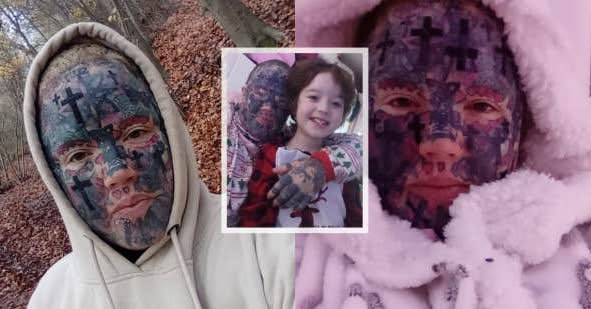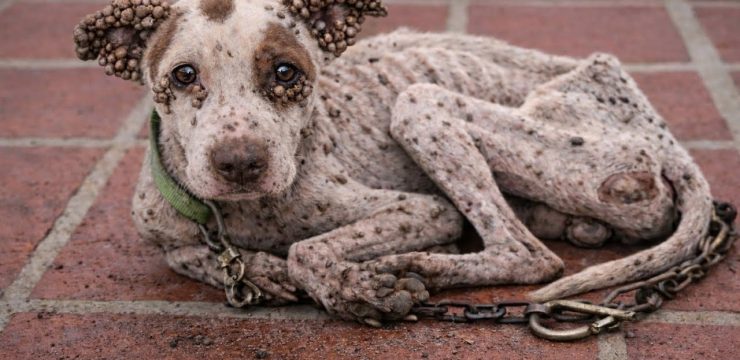One mother, eager to watch her children perform in their school’s nativity play, was shocked when she was denied entry solely because of the tattoos on her face.
Melissa Sloan, a 45-year-old mother of seven, recently shared her story of exclusion, shedding light on the challenges she faces due to her heavily tattooed appearance. Known as a self-proclaimed “tattoo addict,” Sloan has devoted herself to covering her entire body in ink, a journey she has no intention of stopping. In a candid interview with The Sun, she declared, “I’ll keep going as long as I live,” embodying her personal philosophy that life is meant to be lived to its fullest, even if her choices sometimes result in societal pushback.

This philosophy, however, has occasionally interfered with her role as a parent. One recent instance was particularly disheartening: when Sloan arrived at her child’s school for the nativity play, she was turned away by teachers who refused to let her into the auditorium. Instead, they told her to “Go back to the garden,” an apparent reference to the floral tattoos adorning her face.
“‘Look through the class window,’ they told me,” Sloan recounted. “The teachers told me to do that. That’s why I don’t go to the school play anymore.”
Unfortunately, this wasn’t the first time Sloan experienced rejection at her children’s school events. She revealed that she often feels unwelcome at such gatherings, both because of official restrictions and the judgmental stares from other parents and children. The shock and curiosity sparked by her appearance create an environment where she feels like an outsider, unable to enjoy milestones in her children’s lives like other parents.
As a result, Sloan has adapted by sending her partner, Luke, to represent the family at school events. “He’s going tonight to the kids’ fair because I can’t go there—I’m not wanted,” Sloan explained to Leicestershire Live. “I feel so jealous that I can’t be there. I can’t even attend the Christmas fair because I know how teachers and parents look at me.”
Her story has drawn widespread attention, particularly as she continues to speak openly about the prejudice she faces due to her distinctive look. Sloan has made headlines before, revealing that her tattoos have impacted various aspects of her life, including her ability to find employment. In an interview with The Mirror, she admitted, “I still can’t get a job because of my tattoos. I can’t even go into pubs around here because of it.”
She also shared that her tattoos make daily errands challenging. “I can’t even go to the bank because they find my appearance offensive. They say it upsets them in the posh pubs around here,” she explained. Despite the criticism, Sloan remains defiant. “I take no notice,” she said, underscoring her determination to live life her way, no matter the societal judgment.
Sloan’s story has ignited a heated debate online. Some critics argue that her choices come with consequences, while others highlight the broader issue of discrimination. One Reddit user commented, “She sounds addicted. It seems like her tattoos are her coping mechanism, and she might even find the process therapeutic. I hope she gets help. For her kids’ sake, maybe she could try something like Derma Blend to cover the tattoos for school events.”
Another Redditor pointed out the potential legal issues surrounding her treatment. “She actually sounds surprised that she can’t get a job looking like that! This clearly didn’t happen in the U.S., because there would’ve been lawsuits flying from day one.” They added, “I think she looks terrible, but on a basic civil rights level, the school doesn’t have the right to keep her out.”
Despite these discussions, the reality remains that there are no laws protecting individuals with tattoos from discrimination. Workplaces and private establishments, including schools, are free to set their own dress codes or policies about tattoos.
Interestingly, tattoos are increasingly mainstream, with around 30% of Americans now sporting at least one. Studies even show that having tattoos doesn’t typically harm employment opportunities or wages. However, full-body tattoos—like Sloan’s—remain less socially acceptable, especially in professional or formal settings.
Sloan’s story serves as a reminder that, while attitudes toward tattoos have shifted significantly over the years, there’s still a long way to go in fostering widespread acceptance. Her experiences shed light on the challenges faced by individuals whose appearances deviate from conventional norms, particularly when those differences affect their ability to participate in everyday activities like attending a school play.
For Sloan, the hurt caused by her exclusion from her children’s lives outweighs the societal judgment she faces elsewhere. Her resilience and determination to embrace her identity remain steadfast, even in the face of rejection.
Ultimately, her story raises broader questions about individuality, societal standards, and the balance between self-expression and conformity. As tattoos continue to grow in popularity, it’s worth considering how society can become more inclusive, ensuring that personal choices don’t result in exclusion from meaningful moments—like watching a child’s nativity play.





